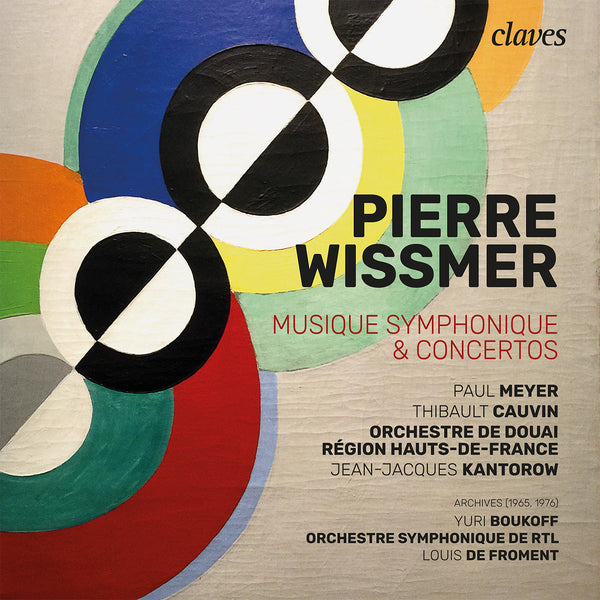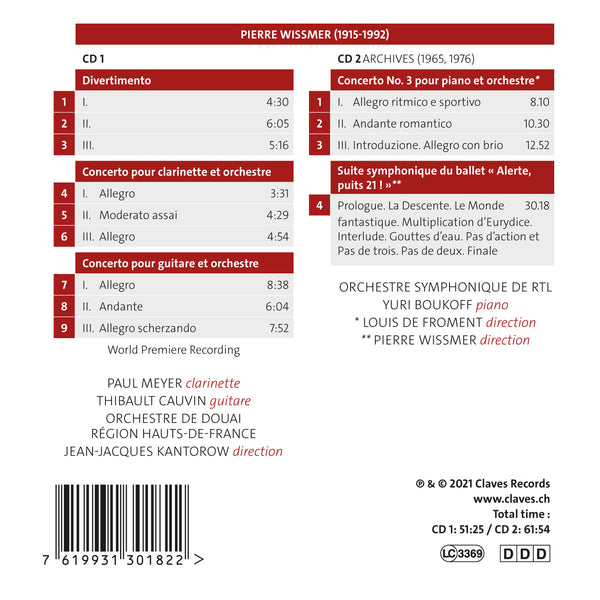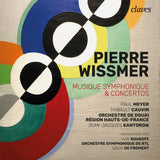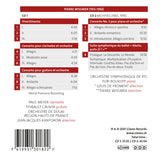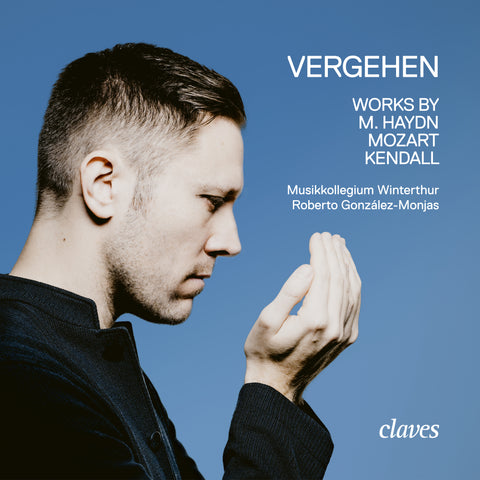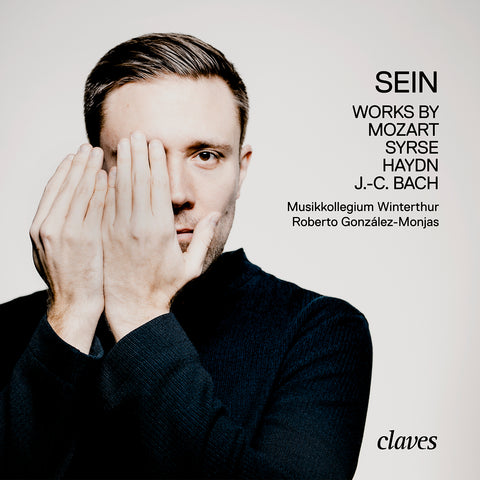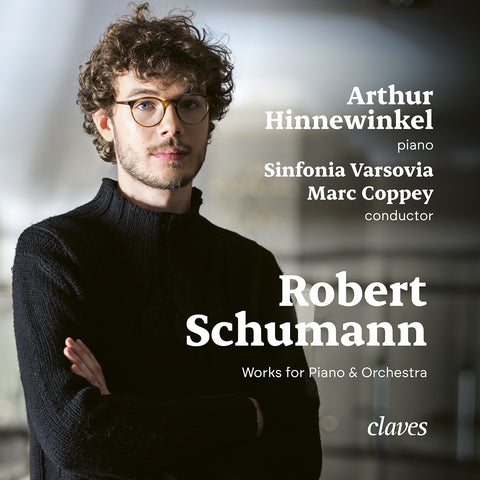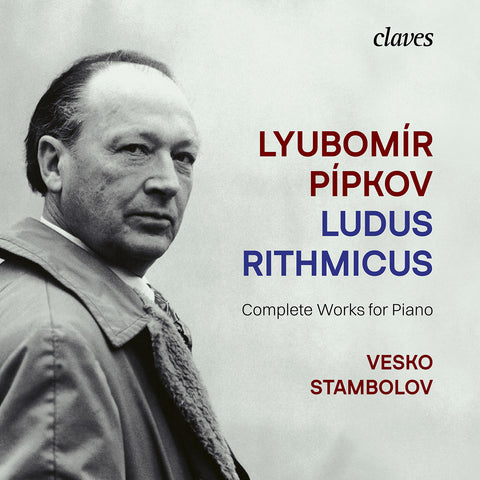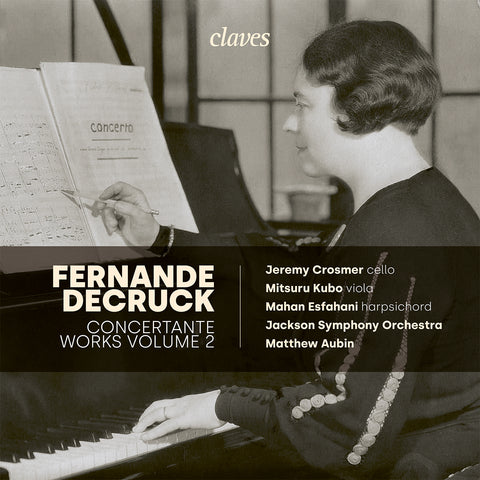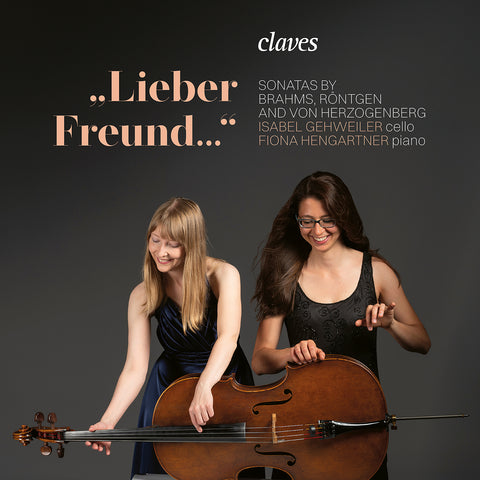(2021) Pierre Wissmer: Musique Symphonique & Concertos
Category(ies): Concerto Orchestra Piano Rarities
Instrument(s): Clarinet Guitar Piano
Main Composer: Pierre Wissmer
Orchestra: Orchestre de Douai - Région Hauts-de-France
Conductor: Jean-Jacques Kantorow
CD set: 2
Catalog N°:
CD 3018/19
Release: 16.04.2021
EAN/UPC: 7619931301822
This album is now on repressing. Pre-order it at a special price now.
CHF 24.00
This album is no longer available on CD.
This album has not been released yet. Pre-order it from now.
CHF 24.00
This album is no longer available on CD.
CHF 24.00
VAT included for Switzerland & UE
Free shipping
This album is no longer available on CD.
VAT included for Switzerland & UE
Free shipping
This album is now on repressing. Pre-order it at a special price now.
CHF 24.00
This album is no longer available on CD.
This album has not been released yet.
Pre-order it at a special price now.
CHF 24.00
This album is no longer available on CD.
CHF 24.00
This album is no longer available on CD.
PIERRE WISSMER: MUSIQUE SYMPHONIQUE & CONCERTOS
PIERRE WISSMER, VIRTUOSO OF THE ORCHESTRA
Born in Geneva, Pierre Wissmer (1915-1992) studied music at the Conservatory of his native city, before leaving for Paris in 1935 where he first worked with Roger-Ducasse, then Daniel-Lesur with whom he perfected his skills. Parallel to his creative career, the musician carried out substantial pedagogical activity which led him to teach musical writing, orchestration and composition at the Schola Cantorum (Paris), the Le Mans Conservatory where he became the director, and the Geneva Conservatory of Music. Similar to Aloÿs Fornerod or Jean Dupérier, he is one of the French-speaking Swiss musicians resolutely committed to France, and in his own way, profoundly influenced by Fauré, Debussy, Ravel or Roussel.
Pierre Wissmer’s style–imbued with a neo-classicism that also manifests the influence of Stravinsky–moved over the years towards both a more distanced relationship with tonality and a more introspective language, notably in his last symphonies. A master of instrumentation, Wissmer excelled in the interaction between soloist and orchestra all the while cultivating with delight the genre of the concerto, in the manner of André Jolivet or Henri Tomasi. If he devoted three concertos to the piano, three to the violin, and four to wind instruments (clarinet, flute, oboe, and trumpet), he also turned to rarer combinations: Concerto for guitar, Symphony Concertante for flute, harp and orchestra, or concerto for orchestra (Concerto valcrosiano).
The guitar holds a significant place in Pierre Wissmer’s catalog; after his Concerto for guitar and orchestra composed in 1954, he wrote several pieces for two guitars, a Partita for this instrument, and he used it in various vocal and instrumental scores.
The Concerto calls for a chamber orchestra that includes wind instruments in pairs. In order to ensure a balance between a solo instrument with limited sound amplitude and a relatively expanded orchestral formation, the composer frequently treats the guitar as a solo instrument alternating with purely orchestral sequences. In passages that bring soloist and orchestra together, the latter is reduced to a very small number of instruments.
>> Read more in the booklet <<
***
ORCHESTRE DE DOUAI - HAUTS-DE-FRANCE RÉGION
Founded in 1971 at the initiative of Henri Vachey, the Orchestre de Douai – Hauts-de-France Region brings together nearly 70 professional musicians from the region. Under the direction of Jean-Jacques Kantorow or renowned guest conductors, such as Georges Prêtre, Gianandrea Noseda, Laurent Petitgirard, Nicolas Giusti, Olivier Grangean, with the help of renowned performers, the Orchestra continues to assert its vocation as a cultural ambassador.
Thus, its members have performed more than 1, 500 concerts, in 200 municipalities in the region, but also in a number of European countries: Belgium, Germany, the United Kingdom, Austria, Italy, Spain, and Poland. So, every year, there are nearly 30,000 people who attend its concerts. Among the latter are many schoolchildren, secondary school pupils and university students (in all, more than 15, 000 young people), and with them in mind, the Orchestra gives performances in close collaboration with the National Education system and other educational initiatives. Honorary Prize of the City of Vienna and First Prize of the City of Stresa, on numerous occasions this Orchestra has appeared on Radio France, as well as leading national television channels.
***
JEAN-JACQUES KANTOROW, CONDUCTOR
After studying at the Cannes Conservatory, Jean-Jacques Kantorow entered the National Conservatory of Music and Dance in Paris at age 13, where a year later, he obtained the 1st Prize in Violin.
Between 1962 and 1968, he won a dozen international prizes, including the Carl Flesch (London), Paganini (Genoa) Prizes, the 1st Prize at the Geneva International Competition, and in 1970, he was awarded a grant from the Sascha Schneider Foundation. With pianist Jacques Rouvier and cellist Philippe Muller, he formed a trio that was given the 1st Grand Prize at the Colmar Chamber Music Competition (1970).
Since then, his concert career has led him to perform on major international stages (the United States, Canada, Eastern Europe, India, Japan, Africa), giving more than one hundred concerts per year. Pursuing a dual career as soloist and chamber musician, Jean-Jacques Kantorow has also taken on orchestral conducting.
A guest of numerous foreign groups, including the Tapiola Sinfonietta, he was previously Music Director of the Orchestre d’Auvergne, the Helsinki Chamber Orchestra and the Ensemble Orchestral de Paris.
As a soloist and likewise as a conductor, he has made a large number of recordings for Denon, EMI, Erato, CBS, and BIS; several of them have garnered international awards.
Jean-Jacques Kantorow has taught violin at the National Conservatory of Music and Dance in Paris, and since 2013, he has been the Principal Conductor and Musical Director of the Orchestre de Douai – Région Hauts-de-France.
***
PAUL MEYER, CLARINET
Paul Meyer made his stunning debut in 1982 by winning the prestigious Eurovision competition and Young Concert Artists in New York at just 17 years old. Since then, he has continued to be greatly impressive. He was appointed Solo Clarinet at the Lyon Opera Orchestra in 1983, then at the Ensemble Intercontemporain in 1984 and at the Paris Opera in 1985. Very quickly, he left the orchestra for an international soloist career, giving performances in noteworthy venues with highly renowned orchestras and alongside the world’s finest musicians, including Benny Goodman, Isaac Stern, Mstislav Rostropovitch, Jean-Pierre Rampal, Martha Argerich, Yuri Bashmet, Gidon Kremer, Yehudi Menuhin, Yo-Yo Ma or Emmanuel Ax.
Always in search of extreme musical sensations, he rapidly oriented himself towards orchestra conducting all the while pursuing his performance skills that have secured him a unique role as a universally acclaimed clarinetist. After founding the Orchestre de Chambre d’Alsace, Paul Meyer has been in great demand as a conductor. This recognition, based on his profound understanding of and experience with orchestral work, rapidly led him to conduct major chamber and symphony orchestras in Europe, Asia, and South America.
His encounter with Pierre Boulez and Luciano Berio–the latter dedicated Alternatim to him–was decisive in the major role he has played in the development of the clarinet repertoire given the premieres of concertos that contemporary composers have written for him.
***
THIBAULT CAUVIN, GUITAR
Thibault Cauvin was born with a guitar in his hands, given to him by his father, a musician himself. From then on, what followed was perfectly natural. He first studied at the Bordeaux Conservatory and then at the National Conservatory of Music and Dance in Paris, graduating with honors. Quite a risk-taker, he fervently participated in international competitions, an unavoidable springboard for an artist who wants to have a real career. Widely acclaimed for his youth, ardor and creativity, he won prize after prize, and by the young age of 20, he had been awarded a total of 36 prizes (13 first ones), more than any other guitar player in the world.
Thibault Cauvin has been touring extensively for 15 years now, playing on the most prestigious stages and most exceptional theaters. His universal playing and endearing personality charm and bring together all kinds of audiences. Specialized critics, as well as popular media, have been unanimously won over by the “Cauvin Phenomenon.” In fact, a classical musician has rarely been as prominent as he has in France. The “Little Prince” has grown up, and his childhood dream to move people’s hearts by performing notes seems to have come true.
REVIEWS
« [..] Cette musique n’engendre pas la mélancolie. Elle s’écoute avec plaisir et prédispose à une certaine légèreté assez inusitée dans l’époque qui fut la sienne, celle des avant-gardes. Même s’il y fut très attentif, il traça son sillon en restant toujours fidèle à lui-même. On ne peut que se réjouir du choix de l’Orchestre de Douai par les Éditions Billaudot, chez qui sont éditées les partitions de Pierre Wissmer, pour faire partie de l’intégrale des enregistrements de son oeuvre complète. Une initiative de L’Action Musicale Pierre Wissmer. La figure tutélaire et la dimension internationale de Jean-Jacques Kantorow, directeur musical et chef de l’orchestre, ayant probablement joué un rôle important dans ce choix qui honore par ailleurs la qualité des musiciens de l’Orchestre de Douai, qui fêtera la saison prochaine son 50e anniversaire ! » - Françoise Objois, avril 2021
« [..] C’est Pierre Wissmer lui-même qui dirige la Suite qu’il aura tirée de son ballet orphique dont Janine Charrat écrivit l’argument, transposant les Enfers à la mine. La beauté de l’orchestre, l’espressivo du tout achève de dresser le portrait éloquent d’un compositeur qu’il est temps de redécouvrir. » - Jean-Charles Hoffelé, novembre 2021
« Pierre Wissmer composa une œuvre importante et très « juste milieu », s’écartant parfois du néoclassicisme des débuts pour s’aventurer sur des terrains harmoniques plus hardis, mais sans jamais s’égarer dans les dédales de l’avant-garde. Après un premier CD il y a trois ans (Classica n° 208 CD 1811), Claves réunit des archives et des nouveautés. [..] Comme à son habitude, Jean-Jacques Kantorow dirige avec souplesse et précision. [..] » - Jacques Bonnaure, juin 2021
« Cette parution est un événement à marquer d'une pierre blanche. Dans cet arc tendu entre les années 1965- 1976 (CD d'archives) et aujourd'hui (premier enregistrement mondial de 2 concertos et du Divertimento), voici rerévélés un grand compositeur et chef d'orchestre. Dont l'oeuvre abondante, extraordinairement diversifiée, apparaîtra, même à qui la découvre pour la première fois, comme un bloc transcendant d'universalité. Une mémoire vivante et revivifiée par un langage personnel, de presque tout ce qui s'est écrit au XXe depuis Debussy, convoquant et condensant Bartok, Stravinski, Poulenc, Frank Martin et bien d'autres... [..] C'est prodigieux ! » - Bertrand Abraham, août 2021
« [..] Le présent album Claves est le bienvenu, d’autant plus qu’il propose des interprétations actuelles et des archives, offrant ainsi un intéressant panorama de la production d’un musicien qui demeure un méconnu. [..] Joué ici en première mondiale discographique, ce concerto, plus développé que les deux partitions précédentes, est destiné à un orchestre de chambre, avec des vents par deux. [..] Cela donne à l’ensemble un côté discrètement raffiné, avec des mélodies bien dialoguées et un grand équilibre dans la structure même de la partition que le guitariste Thibault Caulvin. L’Orchestre de Douai Hauts-de-France, enregistré en octobre 2020 sous la baguette du chevronné Jean-Jacques Kantorow, confère à ces trois partitions toute l’excellence qu’elles réclament en termes de clarté et de finesse. [..] Voilà un programme qui sort des sentiers battus et permet d’approfondir un compositeur au catalogue foisonnant et diversifié. [..] » - Jean Lacroix, avril 2021
« D’origine suisse mais naturalisé français en 1958, Pierre Wissmer fit ses études à la Schola Cantorum où il suivit l’enseignement de Roger-Ducasse puis Daniel-Lesur qui le marqua profondément. Pédagogue au conservatoire de Genève et à la Schola mais surtout compositeur prolixe, il écrivit dans tous les genres musicaux, de la scène à la musique de chambre en passant par neuf symphonies (cf. n° 602) et de nombreux concertos (cf. n° 676). Claves lui rend hommage en agrégeant archives et nouveaux enregistrements. [..] C’est un visage plus immédiatement séduisant que présentent les trois pages des années 1950 confiées à l’excellent Jean-Jacques Kantorow. Comme le lumineux Divertimento, flatté par les couleurs acidulées de l’Orchestre de Douai, les deux concertos semblent naviguer entre la gouaille des Six et la fausse légèreté d’un Jean Françaix. Paul Meyer insuffle son brio espiègle à celui pour clarinette, tandis que Thibaut Cauvin se fait plus rêveur et tendre dans celui pour guitare. Portrait généreux et varié d’un musicien à redécouvrir. » - Jean-Claude Hulot, avril 2021
« [..] So hart es klingen mag: Die Musik von Pierre Wissmer (1915–1992) ist praktisch vollkommen in Vergessenheit geraten. Das war zu Lebzeiten des Schweizer Tondichters anders, seine an Ravel und Strawinsky erinnernden Werke wurden durchaus gespielt, vor allem die Instrumentalkonzerte. Vermutlich versucht man eine ‚Wiederbelebung‘ beim Label Claves (mit einem dezenten Hauch von Lokalpatriotismus) deshalb schwerpunktmäßig mit einigen dieser Konzerte, drei Stücke sind auf der vorliegenden Doppel-CD versammelt: Das 1960 entstandene Klarinettenkonzert, das sechs Jahre zuvor komponierte Gitarrenkonzert und das 1972 geschriebene dritte Klavierkonzert. Dazu kommen noch zwei weitere Werke. [..] » - Dr. Michael Loos, Juli 2021
« Diese CD führt uns einmal mehr vor Augen, wieviel bemerkenswerte Musik es gibt, von der wir noch nie gehört haben. Pierre Wissmer (1915-1992) ist zu seiner Zeit und in seinem Radius sehr wohl ästimiert worden, hat es aber nicht geschafft, sich in den Kanon der allgemein bekannten Namen einzureihen. Dabei geht sein umfangreiches Schaffen quer durch die Gattungen und zeigt kompositorische Meisterschaft, besonders im Bereich der Instrumentation. [..] Das vorliegende Doppelalbum fokussiert auf die Orchestermusik und innerhalb dieser auf das Solokonzert. Eingespielt sind das dritte Klavierkonzert und das Klarinettenkonzert, dazu eines in der seltenen Besetzung Gitarre und Orchester. Allesamt sind sie tadellos musiziert und machen dem Komponisten Ehre. [..] » - Stephan Thomas, Mai 2022
“[..] At least on me, it has an enchanting effect. I don't want to make comparisons, but it reminds me of the music of - these are just examples - Jolivet, Poulenc and Ravel. In the interplay between solo instrument and orchestra, too, Wissmer shows himself to be a master in the ravishing concertare, also using the technical possibilities of the instruments with great refinement and finesse. [..]” - Aart van der Wal, April 2021
“The French-Swiss composer, pedagogue and manager Pierre Wissmer (1915-1992), born in Geneva, created with his Divertimento a neoclassical piece, whose agile outer movements and its delicate middle movement make the imaginative music characteristic. [..]” - Remy Franck, April 2021
PIERRE WISSMER, VIRTUOSO OF THE ORCHESTRA
Born in Geneva, Pierre Wissmer (1915-1992) studied music at the Conservatory of his native city, before leaving for Paris in 1935 where he first worked with Roger-Ducasse, then Daniel-Lesur with whom he perfected his skills. Parallel to his creative career, the musician carried out substantial pedagogical activity which led him to teach musical writing, orchestration and composition at the Schola Cantorum (Paris), the Le Mans Conservatory where he became the director, and the Geneva Conservatory of Music. Similar to Aloÿs Fornerod or Jean Dupérier, he is one of the French-speaking Swiss musicians resolutely committed to France, and in his own way, profoundly influenced by Fauré, Debussy, Ravel or Roussel.
Pierre Wissmer’s style–imbued with a neo-classicism that also manifests the influence of Stravinsky–moved over the years towards both a more distanced relationship with tonality and a more introspective language, notably in his last symphonies. A master of instrumentation, Wissmer excelled in the interaction between soloist and orchestra all the while cultivating with delight the genre of the concerto, in the manner of André Jolivet or Henri Tomasi. If he devoted three concertos to the piano, three to the violin, and four to wind instruments (clarinet, flute, oboe, and trumpet), he also turned to rarer combinations: Concerto for guitar, Symphony Concertante for flute, harp and orchestra, or concerto for orchestra (Concerto valcrosiano).
The guitar holds a significant place in Pierre Wissmer’s catalog; after his Concerto for guitar and orchestra composed in 1954, he wrote several pieces for two guitars, a Partita for this instrument, and he used it in various vocal and instrumental scores.
The Concerto calls for a chamber orchestra that includes wind instruments in pairs. In order to ensure a balance between a solo instrument with limited sound amplitude and a relatively expanded orchestral formation, the composer frequently treats the guitar as a solo instrument alternating with purely orchestral sequences. In passages that bring soloist and orchestra together, the latter is reduced to a very small number of instruments.
>> Read more in the booklet <<
***
ORCHESTRE DE DOUAI - HAUTS-DE-FRANCE RÉGION
Founded in 1971 at the initiative of Henri Vachey, the Orchestre de Douai – Hauts-de-France Region brings together nearly 70 professional musicians from the region. Under the direction of Jean-Jacques Kantorow or renowned guest conductors, such as Georges Prêtre, Gianandrea Noseda, Laurent Petitgirard, Nicolas Giusti, Olivier Grangean, with the help of renowned performers, the Orchestra continues to assert its vocation as a cultural ambassador.
Thus, its members have performed more than 1, 500 concerts, in 200 municipalities in the region, but also in a number of European countries: Belgium, Germany, the United Kingdom, Austria, Italy, Spain, and Poland. So, every year, there are nearly 30,000 people who attend its concerts. Among the latter are many schoolchildren, secondary school pupils and university students (in all, more than 15, 000 young people), and with them in mind, the Orchestra gives performances in close collaboration with the National Education system and other educational initiatives. Honorary Prize of the City of Vienna and First Prize of the City of Stresa, on numerous occasions this Orchestra has appeared on Radio France, as well as leading national television channels.
***
JEAN-JACQUES KANTOROW, CONDUCTOR
After studying at the Cannes Conservatory, Jean-Jacques Kantorow entered the National Conservatory of Music and Dance in Paris at age 13, where a year later, he obtained the 1st Prize in Violin.
Between 1962 and 1968, he won a dozen international prizes, including the Carl Flesch (London), Paganini (Genoa) Prizes, the 1st Prize at the Geneva International Competition, and in 1970, he was awarded a grant from the Sascha Schneider Foundation. With pianist Jacques Rouvier and cellist Philippe Muller, he formed a trio that was given the 1st Grand Prize at the Colmar Chamber Music Competition (1970).
Since then, his concert career has led him to perform on major international stages (the United States, Canada, Eastern Europe, India, Japan, Africa), giving more than one hundred concerts per year. Pursuing a dual career as soloist and chamber musician, Jean-Jacques Kantorow has also taken on orchestral conducting.
A guest of numerous foreign groups, including the Tapiola Sinfonietta, he was previously Music Director of the Orchestre d’Auvergne, the Helsinki Chamber Orchestra and the Ensemble Orchestral de Paris.
As a soloist and likewise as a conductor, he has made a large number of recordings for Denon, EMI, Erato, CBS, and BIS; several of them have garnered international awards.
Jean-Jacques Kantorow has taught violin at the National Conservatory of Music and Dance in Paris, and since 2013, he has been the Principal Conductor and Musical Director of the Orchestre de Douai – Région Hauts-de-France.
***
PAUL MEYER, CLARINET
Paul Meyer made his stunning debut in 1982 by winning the prestigious Eurovision competition and Young Concert Artists in New York at just 17 years old. Since then, he has continued to be greatly impressive. He was appointed Solo Clarinet at the Lyon Opera Orchestra in 1983, then at the Ensemble Intercontemporain in 1984 and at the Paris Opera in 1985. Very quickly, he left the orchestra for an international soloist career, giving performances in noteworthy venues with highly renowned orchestras and alongside the world’s finest musicians, including Benny Goodman, Isaac Stern, Mstislav Rostropovitch, Jean-Pierre Rampal, Martha Argerich, Yuri Bashmet, Gidon Kremer, Yehudi Menuhin, Yo-Yo Ma or Emmanuel Ax.
Always in search of extreme musical sensations, he rapidly oriented himself towards orchestra conducting all the while pursuing his performance skills that have secured him a unique role as a universally acclaimed clarinetist. After founding the Orchestre de Chambre d’Alsace, Paul Meyer has been in great demand as a conductor. This recognition, based on his profound understanding of and experience with orchestral work, rapidly led him to conduct major chamber and symphony orchestras in Europe, Asia, and South America.
His encounter with Pierre Boulez and Luciano Berio–the latter dedicated Alternatim to him–was decisive in the major role he has played in the development of the clarinet repertoire given the premieres of concertos that contemporary composers have written for him.
***
THIBAULT CAUVIN, GUITAR
Thibault Cauvin was born with a guitar in his hands, given to him by his father, a musician himself. From then on, what followed was perfectly natural. He first studied at the Bordeaux Conservatory and then at the National Conservatory of Music and Dance in Paris, graduating with honors. Quite a risk-taker, he fervently participated in international competitions, an unavoidable springboard for an artist who wants to have a real career. Widely acclaimed for his youth, ardor and creativity, he won prize after prize, and by the young age of 20, he had been awarded a total of 36 prizes (13 first ones), more than any other guitar player in the world.
Thibault Cauvin has been touring extensively for 15 years now, playing on the most prestigious stages and most exceptional theaters. His universal playing and endearing personality charm and bring together all kinds of audiences. Specialized critics, as well as popular media, have been unanimously won over by the “Cauvin Phenomenon.” In fact, a classical musician has rarely been as prominent as he has in France. The “Little Prince” has grown up, and his childhood dream to move people’s hearts by performing notes seems to have come true.
REVIEWS
« [..] Cette musique n’engendre pas la mélancolie. Elle s’écoute avec plaisir et prédispose à une certaine légèreté assez inusitée dans l’époque qui fut la sienne, celle des avant-gardes. Même s’il y fut très attentif, il traça son sillon en restant toujours fidèle à lui-même. On ne peut que se réjouir du choix de l’Orchestre de Douai par les Éditions Billaudot, chez qui sont éditées les partitions de Pierre Wissmer, pour faire partie de l’intégrale des enregistrements de son oeuvre complète. Une initiative de L’Action Musicale Pierre Wissmer. La figure tutélaire et la dimension internationale de Jean-Jacques Kantorow, directeur musical et chef de l’orchestre, ayant probablement joué un rôle important dans ce choix qui honore par ailleurs la qualité des musiciens de l’Orchestre de Douai, qui fêtera la saison prochaine son 50e anniversaire ! » - Françoise Objois, avril 2021
« [..] C’est Pierre Wissmer lui-même qui dirige la Suite qu’il aura tirée de son ballet orphique dont Janine Charrat écrivit l’argument, transposant les Enfers à la mine. La beauté de l’orchestre, l’espressivo du tout achève de dresser le portrait éloquent d’un compositeur qu’il est temps de redécouvrir. » - Jean-Charles Hoffelé, novembre 2021
« Pierre Wissmer composa une œuvre importante et très « juste milieu », s’écartant parfois du néoclassicisme des débuts pour s’aventurer sur des terrains harmoniques plus hardis, mais sans jamais s’égarer dans les dédales de l’avant-garde. Après un premier CD il y a trois ans (Classica n° 208 CD 1811), Claves réunit des archives et des nouveautés. [..] Comme à son habitude, Jean-Jacques Kantorow dirige avec souplesse et précision. [..] » - Jacques Bonnaure, juin 2021
« Cette parution est un événement à marquer d'une pierre blanche. Dans cet arc tendu entre les années 1965- 1976 (CD d'archives) et aujourd'hui (premier enregistrement mondial de 2 concertos et du Divertimento), voici rerévélés un grand compositeur et chef d'orchestre. Dont l'oeuvre abondante, extraordinairement diversifiée, apparaîtra, même à qui la découvre pour la première fois, comme un bloc transcendant d'universalité. Une mémoire vivante et revivifiée par un langage personnel, de presque tout ce qui s'est écrit au XXe depuis Debussy, convoquant et condensant Bartok, Stravinski, Poulenc, Frank Martin et bien d'autres... [..] C'est prodigieux ! » - Bertrand Abraham, août 2021
« [..] Le présent album Claves est le bienvenu, d’autant plus qu’il propose des interprétations actuelles et des archives, offrant ainsi un intéressant panorama de la production d’un musicien qui demeure un méconnu. [..] Joué ici en première mondiale discographique, ce concerto, plus développé que les deux partitions précédentes, est destiné à un orchestre de chambre, avec des vents par deux. [..] Cela donne à l’ensemble un côté discrètement raffiné, avec des mélodies bien dialoguées et un grand équilibre dans la structure même de la partition que le guitariste Thibault Caulvin. L’Orchestre de Douai Hauts-de-France, enregistré en octobre 2020 sous la baguette du chevronné Jean-Jacques Kantorow, confère à ces trois partitions toute l’excellence qu’elles réclament en termes de clarté et de finesse. [..] Voilà un programme qui sort des sentiers battus et permet d’approfondir un compositeur au catalogue foisonnant et diversifié. [..] » - Jean Lacroix, avril 2021
« D’origine suisse mais naturalisé français en 1958, Pierre Wissmer fit ses études à la Schola Cantorum où il suivit l’enseignement de Roger-Ducasse puis Daniel-Lesur qui le marqua profondément. Pédagogue au conservatoire de Genève et à la Schola mais surtout compositeur prolixe, il écrivit dans tous les genres musicaux, de la scène à la musique de chambre en passant par neuf symphonies (cf. n° 602) et de nombreux concertos (cf. n° 676). Claves lui rend hommage en agrégeant archives et nouveaux enregistrements. [..] C’est un visage plus immédiatement séduisant que présentent les trois pages des années 1950 confiées à l’excellent Jean-Jacques Kantorow. Comme le lumineux Divertimento, flatté par les couleurs acidulées de l’Orchestre de Douai, les deux concertos semblent naviguer entre la gouaille des Six et la fausse légèreté d’un Jean Françaix. Paul Meyer insuffle son brio espiègle à celui pour clarinette, tandis que Thibaut Cauvin se fait plus rêveur et tendre dans celui pour guitare. Portrait généreux et varié d’un musicien à redécouvrir. » - Jean-Claude Hulot, avril 2021
« [..] So hart es klingen mag: Die Musik von Pierre Wissmer (1915–1992) ist praktisch vollkommen in Vergessenheit geraten. Das war zu Lebzeiten des Schweizer Tondichters anders, seine an Ravel und Strawinsky erinnernden Werke wurden durchaus gespielt, vor allem die Instrumentalkonzerte. Vermutlich versucht man eine ‚Wiederbelebung‘ beim Label Claves (mit einem dezenten Hauch von Lokalpatriotismus) deshalb schwerpunktmäßig mit einigen dieser Konzerte, drei Stücke sind auf der vorliegenden Doppel-CD versammelt: Das 1960 entstandene Klarinettenkonzert, das sechs Jahre zuvor komponierte Gitarrenkonzert und das 1972 geschriebene dritte Klavierkonzert. Dazu kommen noch zwei weitere Werke. [..] » - Dr. Michael Loos, Juli 2021
« Diese CD führt uns einmal mehr vor Augen, wieviel bemerkenswerte Musik es gibt, von der wir noch nie gehört haben. Pierre Wissmer (1915-1992) ist zu seiner Zeit und in seinem Radius sehr wohl ästimiert worden, hat es aber nicht geschafft, sich in den Kanon der allgemein bekannten Namen einzureihen. Dabei geht sein umfangreiches Schaffen quer durch die Gattungen und zeigt kompositorische Meisterschaft, besonders im Bereich der Instrumentation. [..] Das vorliegende Doppelalbum fokussiert auf die Orchestermusik und innerhalb dieser auf das Solokonzert. Eingespielt sind das dritte Klavierkonzert und das Klarinettenkonzert, dazu eines in der seltenen Besetzung Gitarre und Orchester. Allesamt sind sie tadellos musiziert und machen dem Komponisten Ehre. [..] » - Stephan Thomas, Mai 2022
“[..] At least on me, it has an enchanting effect. I don't want to make comparisons, but it reminds me of the music of - these are just examples - Jolivet, Poulenc and Ravel. In the interplay between solo instrument and orchestra, too, Wissmer shows himself to be a master in the ravishing concertare, also using the technical possibilities of the instruments with great refinement and finesse. [..]” - Aart van der Wal, April 2021
“The French-Swiss composer, pedagogue and manager Pierre Wissmer (1915-1992), born in Geneva, created with his Divertimento a neoclassical piece, whose agile outer movements and its delicate middle movement make the imaginative music characteristic. [..]” - Remy Franck, April 2021
Return to the album | Read the booklet | Composer(s): Pierre Wissmer | Main Artist: Jean-Jacques Kantorow






